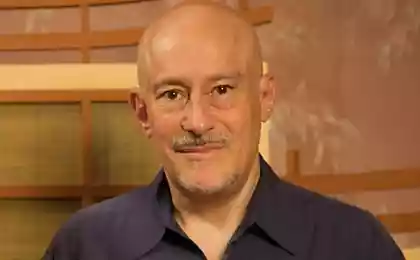1139
Simple things that, in fact, very difficult (10 photos)
There are many things in the world that are difficult for us to understand. But we should admit that there are quite simple ideas and concepts, understanding available to us all. However, as often happens in life when you start to dig into these simple ideas, it turns out that you are faced with a formidable task.

1. The mathematical proof of the "1 + 1 = 2" of 300 pages

The equation of "1 + 1 = 2" perhaps the first mathematical task that we learn as addition and subtraction seem the simplest concepts in mathematics. If you have an apple and you are given another apple, you is two apples. It seems that this simple equation that is clear to everyone from a young age.
It's hard to believe, but the proof of the "1 + 1 = 2" is the work of more than 300 pages, and it was not proved until the 20th century.
In the early 20th century mathematician Bertrand Russell decided to prove conclusively that the math works, and decided to start with simple concepts that we know, to prove the "1 + 1 = 2". However, what seems a simple task, in fact, took mathematician and philosopher 372 pages of complex calculations. The decision was published in the three-volume work & quot; Principia Mathematica & quot; ("Principles of Mathematics»).
2. The definition of "almost certain" probability theory

If we want to say that an event is almost certain to happen, how do we explain this little child? Can you say that the event is almost guaranteed to happen, but then you have to explain what "almost", which will further complicate the problem.
The fact that "almost certainly" - a very vague concept. Fortunately it exists in statistical mathematics, where it is fully explained. Unfortunately, this explanation looks pretty scary.
To put it simply, even if the event 100 percent chance that it will happen, it does not necessarily happen. For example, if you toss a coin a million times, statistically the chances of a coin falling face at least once actually is one. However, there is an infinitely small chance that a coin will fall each time the reverse side.
Although the probability that an event will occur in all respects is guaranteed, it is impossible to say.
3. How does the bike?

Bicycles There are more than 100 years, ever since they were invented, we developed land, sea and air modes of travel. We have airplanes that fly around the world in a matter of hours, and it seems that we have long understood all about the simple bicycle.
However, this is not so, and scientists are still arguing about how a bicycle works, or rather, it remains stable.
For a long time it was believed that the power of the gyroscopic rotation of the wheels kept the bike, but when scientists have developed a special bike with a device that counteracted the gyroscopic action of the wheels, it remained stable, and no one could explain why.
Since the dynamic properties of the bicycle are not a branch of science, which scientists want to spend your time, maybe we will not soon know the answer.
4. What is the length of the rope?

If someone gives you a piece of rope, and ask how long it is, you decide that the answer to this question is very simple. But when the question was asked a group of scientists, the answer was "it depends on a number of factors", but rather on who you ask.
Mathematicians say that a piece of rope could theoretically have an infinite length, while the physicists will argue that because of the nature of subatomic physics and the fact that the atoms can be in two places at the same time, an accurate measurement of the length of the rope is not impossible.
5. Why do people yawn?

Yawning - is not well understood phenomenon. Even the talk about yawning can make you start doing it. There is no function like her.
Did you know the theory, that the purpose of yawning is to maintain the clarity of mind, since we yawn swallow extra portion of oxygen. This is reasonable, since we often yawn when tired, and we were bored, and when we need an extra burst of energy.
However, experiments have refuted this assumption. In fact, there is no generally accepted theory about why we yawn. There is also a theory that the brain zevotaohlazhdaet, as experiments have shown that yawning during temperature changes of the brain. However, the answer to why yawning is contagious, and no.
6. Where a right, where the left?

How do you explain the concept of "right and left" to those who do not know what these words mean? You will begin to explain in terms of your relative position in relation to a fixed object? Or try to think outside the box and refer to the rotation of the Earth?
What if you had to explain these concepts stranger whose planet rotates differently or who can not see?
This question occupies the minds of philosophers, many years, as in the absence of a reference point, it is very difficult to determine what is the right and the left.
Since the German philosopher Immanuel Kant once said: "Let's imagine that the first thing created would be the hand of man, and it should be a right or left hand." However, on the one hand it is impossible to explain what a hand, without the presence of the other.
Right and left hand are different from each other, but if you need to describe them, the description will be identical, since they are the same. But they are different, because the left hand does not fit into the right glove. However, this difference can not be described without the presence of the other hand.
For your information, there is a book of 400 pages devoted to the philosophy of right and left.
7. We enjoy not for pleasure

Fun - it's a strange thing, because it is subjective. For every person who likes a certain food, song, or find another movie that also hates all of the above. We think that the reason that we enjoy something, is the fact that it brings us pleasure, but scientists have proved that this is not always the case.
For example, a person can see that he likes a certain food or wine, if you tell him that it is very expensive. Pleasure is not the main factor. In marketing, this is known as "Chivas Regal effect", named after a Scottish whiskey with the same name, whose sales increased after raising product prices.
Also, experiments were conducted in which wine experts forced to think that the cheapest bottle of wine was exceptional exposure by changing the label.
The pleasure of the product was not based on love and worthy assessment of wine, but only on the fact that someone said that it was good.
8. The reason for the bite of mosquitoes

If you are once bitten by mosquitoes, it's likely you've heard of the possible versions of why they did it. Maybe blame your scent, or blood or your shirt.
Scientists believe that all of these factors can cause the mosquito bite is you. Since 20 percent of people inexplicably attractive to mosquitoes, and no one can come to an agreement, why this is happening.
The simple answer may be something in the blood that attracts mosquitoes. However, it appears that mosquitoes are attracted chemical signal emitted by the body, is present in 85 percent of people. This explains why some people mosquitoes almost never touch.
There is also a theory that attracts mosquitoes dark or bright colors. In other words, blame your clothes.
9. Rock-paper-scissors - the most serious game in the world

Nothing could be simpler game "rock-paper-scissors", and this is the best way to resolve the dispute, since it is all a coincidence. However, not all so simple. There are dozens of works devoted to this subject. The game has become a favorite topic of research psychologists, since it is closely intertwined with the human subconscious reaction and game theory.
In this regard, there are dozens of strategies to gain an advantage in the game, including the game blindfolded to avoid the influence of the subconscious body language of your opponent.

1. The mathematical proof of the "1 + 1 = 2" of 300 pages

The equation of "1 + 1 = 2" perhaps the first mathematical task that we learn as addition and subtraction seem the simplest concepts in mathematics. If you have an apple and you are given another apple, you is two apples. It seems that this simple equation that is clear to everyone from a young age.
It's hard to believe, but the proof of the "1 + 1 = 2" is the work of more than 300 pages, and it was not proved until the 20th century.
In the early 20th century mathematician Bertrand Russell decided to prove conclusively that the math works, and decided to start with simple concepts that we know, to prove the "1 + 1 = 2". However, what seems a simple task, in fact, took mathematician and philosopher 372 pages of complex calculations. The decision was published in the three-volume work & quot; Principia Mathematica & quot; ("Principles of Mathematics»).
2. The definition of "almost certain" probability theory

If we want to say that an event is almost certain to happen, how do we explain this little child? Can you say that the event is almost guaranteed to happen, but then you have to explain what "almost", which will further complicate the problem.
The fact that "almost certainly" - a very vague concept. Fortunately it exists in statistical mathematics, where it is fully explained. Unfortunately, this explanation looks pretty scary.
To put it simply, even if the event 100 percent chance that it will happen, it does not necessarily happen. For example, if you toss a coin a million times, statistically the chances of a coin falling face at least once actually is one. However, there is an infinitely small chance that a coin will fall each time the reverse side.
Although the probability that an event will occur in all respects is guaranteed, it is impossible to say.
3. How does the bike?

Bicycles There are more than 100 years, ever since they were invented, we developed land, sea and air modes of travel. We have airplanes that fly around the world in a matter of hours, and it seems that we have long understood all about the simple bicycle.
However, this is not so, and scientists are still arguing about how a bicycle works, or rather, it remains stable.
For a long time it was believed that the power of the gyroscopic rotation of the wheels kept the bike, but when scientists have developed a special bike with a device that counteracted the gyroscopic action of the wheels, it remained stable, and no one could explain why.
Since the dynamic properties of the bicycle are not a branch of science, which scientists want to spend your time, maybe we will not soon know the answer.
4. What is the length of the rope?

If someone gives you a piece of rope, and ask how long it is, you decide that the answer to this question is very simple. But when the question was asked a group of scientists, the answer was "it depends on a number of factors", but rather on who you ask.
Mathematicians say that a piece of rope could theoretically have an infinite length, while the physicists will argue that because of the nature of subatomic physics and the fact that the atoms can be in two places at the same time, an accurate measurement of the length of the rope is not impossible.
5. Why do people yawn?

Yawning - is not well understood phenomenon. Even the talk about yawning can make you start doing it. There is no function like her.
Did you know the theory, that the purpose of yawning is to maintain the clarity of mind, since we yawn swallow extra portion of oxygen. This is reasonable, since we often yawn when tired, and we were bored, and when we need an extra burst of energy.
However, experiments have refuted this assumption. In fact, there is no generally accepted theory about why we yawn. There is also a theory that the brain zevotaohlazhdaet, as experiments have shown that yawning during temperature changes of the brain. However, the answer to why yawning is contagious, and no.
6. Where a right, where the left?

How do you explain the concept of "right and left" to those who do not know what these words mean? You will begin to explain in terms of your relative position in relation to a fixed object? Or try to think outside the box and refer to the rotation of the Earth?
What if you had to explain these concepts stranger whose planet rotates differently or who can not see?
This question occupies the minds of philosophers, many years, as in the absence of a reference point, it is very difficult to determine what is the right and the left.
Since the German philosopher Immanuel Kant once said: "Let's imagine that the first thing created would be the hand of man, and it should be a right or left hand." However, on the one hand it is impossible to explain what a hand, without the presence of the other.
Right and left hand are different from each other, but if you need to describe them, the description will be identical, since they are the same. But they are different, because the left hand does not fit into the right glove. However, this difference can not be described without the presence of the other hand.
For your information, there is a book of 400 pages devoted to the philosophy of right and left.
7. We enjoy not for pleasure

Fun - it's a strange thing, because it is subjective. For every person who likes a certain food, song, or find another movie that also hates all of the above. We think that the reason that we enjoy something, is the fact that it brings us pleasure, but scientists have proved that this is not always the case.
For example, a person can see that he likes a certain food or wine, if you tell him that it is very expensive. Pleasure is not the main factor. In marketing, this is known as "Chivas Regal effect", named after a Scottish whiskey with the same name, whose sales increased after raising product prices.
Also, experiments were conducted in which wine experts forced to think that the cheapest bottle of wine was exceptional exposure by changing the label.
The pleasure of the product was not based on love and worthy assessment of wine, but only on the fact that someone said that it was good.
8. The reason for the bite of mosquitoes

If you are once bitten by mosquitoes, it's likely you've heard of the possible versions of why they did it. Maybe blame your scent, or blood or your shirt.
Scientists believe that all of these factors can cause the mosquito bite is you. Since 20 percent of people inexplicably attractive to mosquitoes, and no one can come to an agreement, why this is happening.
The simple answer may be something in the blood that attracts mosquitoes. However, it appears that mosquitoes are attracted chemical signal emitted by the body, is present in 85 percent of people. This explains why some people mosquitoes almost never touch.
There is also a theory that attracts mosquitoes dark or bright colors. In other words, blame your clothes.
9. Rock-paper-scissors - the most serious game in the world

Nothing could be simpler game "rock-paper-scissors", and this is the best way to resolve the dispute, since it is all a coincidence. However, not all so simple. There are dozens of works devoted to this subject. The game has become a favorite topic of research psychologists, since it is closely intertwined with the human subconscious reaction and game theory.
In this regard, there are dozens of strategies to gain an advantage in the game, including the game blindfolded to avoid the influence of the subconscious body language of your opponent.
























